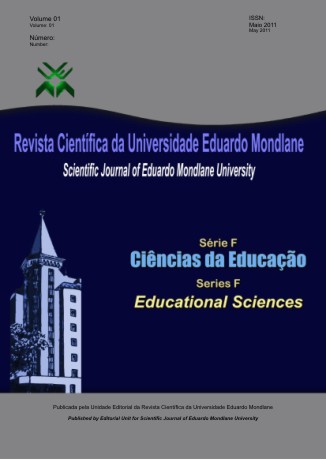Parcerias de aconselhamento entre Universidades e Escolas na educação de professores: O caso das escolas do Município de Maputo
Resumo
Este artigo discute os resultados de um estudo cujo objectivo era de analisar o apoio providenciado pelas escolas aos estudantes estagiários durante a formação inicial como professores. O estudo é parte de um projecto grande cujos objectivos são para estreitar parcerias entre escolas e universidades durante a formação inicial de professores. O projecto é uma colaboração de quatro Universidades em quatro países, Moçambique, Malawi, Irlanda do Norte e Uganda, para partilhar boas práticas e providenciar apoio a supervisores das Universidades e professores nas escolas através de workshops em cada país. O primeiro destes workshops que teve lugar em Maputo, em Outubro de 2010. Seis escolas pilotos foram escolhidas para participarem nos workshops de capacitação em mentoria. Em princípio, os professores indicaram a sua vontade de reflectir e analisar suas próprias práticas e identificar áreas que precisam de melhoramento. Deste modo, estiveram em melhor posição de assistir aos estudantes estagiários duma forma mais estruturada e sistemática. Através de programas de capacitação, os conceitos de mentoria, professores como praticantes reflexivos, processos de observação de aulas, análise e discussão da retroalimentação foram examinados, usando aulas previamente gravadas por alguns dos professores. Os resultados confirmaram a importância de uma boa mentoria e de parcerias efectivas, destacando os benefícios acrescidos não só para estudantes-estagiários, mas também para a universidade, supervisores, mentores, professores e alunos. Actualmente, há falta de integração entre a Universidade e escolas na provisão de apoio aos estudantes-estagiários. Uma maior planificação cooperativa pode ajudar a assegurar que os estudantes-estagiários tenham melhores e possíveis oportunidades de aprender, partindo dos professores mais experientes nas escolas.
Referências
BRISARD, E.; MENTER, I. and SMITH, I. Models of Partnership. In: Programmes of Initial Teacher Education: systematic literature review commissioned by the General Teaching Council for Scotland. Research Publication. Edinburgh: General Teaching Council for Scotland, 2005.
CHAMBO, G. A. and TEMBE, S. S. (Personal communication, May, 2011). Maputo.
DARLING-HAMMOND, L. Teacher quality and student achievement: a review of state policy evidence. Educational Policy Analysis Archives, v. 8, n. 1, 2000. Available in: http://epaa.asu.edu/epaa/v8n1. Acessado em: 18 de Março de 2012.
KERRY, T. and SHELTON MAYES, A. Issues in Mentoring. London: Routledge, 1995.
FALK , B. Supporting teacher learning: from novice to experienced to mentor teacher. The New Educator: v. 7, n. 2, p. 111-113, 2011.
FESSLER, R. and CHRISTENSEN, J. C. The teacher career cycle: understanding and guiding the professional development of teachers. Boston: Allyn & Bacon, 1992.
FISCHER, C.T. and VAN ANDEL, D. History of education, 2002.
HULING-AUSTIN, L. E. Teacher induction programs and internships. In: HOUSTON, W. R. (ed.), Handbook of research on teacher education. New York: Macmillan, 1990, p. 535-548.
KERRY, T. and SHELTON MAYES, A. Issues in Mentoring. London: Routledg, 1995.
MAANDAG, D. W. et al. Teacher Education in Schools: an international comparison. European Journal of Teacher Education, v. 30, n. 2, p. 151-173, 2007.
MAYNARD, T. and FURLONG, J. E. Learning to teach and Models of MentoringDARLING-HAMMOND, L. Teacher Education and the American Future. Journal of Teacher Education, v. 61, n. 1-2, p. 35-47, 2010.
EHRICH, C.; HANSFORD, B. A. and TENNENT, L. Formal Mentoring Programs in Education and Other Professions: a review of the literature. Educational Administration Quarterly, v. 40, p. 518-540, 2004.
ELLIOTT, B. and CALDERHEAD, J. Mentoring for teacher development: possibilities and caveats. In KERRY. In: KERRY, T. E; SHELTON MAYES, A. (ed.). Issues in Mentoring. London: Routledge, 1995. p. 10-24.
MCINTYRE, D. Teacher education research in a new context: the 0xford Internship Scheme. London: Paul Chapman, 1997.
POLLARD, A. Reflective teaching: evidence informed professional practice. 3. ed. London: Continuum, 2008.
PORTER, H. Mentoring New Teachers. 3. ed. California: Corwin, 2008.
PROBYN, M. J. and van der MESCHT, H. Mentoring and prospects for teacher development: a South African perspective. In: MENTORING IN THE NEW MILLENIUM: THE SECOND BRITISH COUNCIL REGIONAL MENTOR CONFERENCE. Anais…, 13-16., April, 2000, Cluj-Napoca, Romania, 2001.
SCHON, D. Educating the Reflective Practitioner. San Francisco: Jossey-Bass, 1991.
SHULMAN, L. Knowledge and teaching: foundations of the new reform, Harvard Educational Review, v. 57, p. 1-22, 1987.
SPARKS Iniciais do nome and HORSLEY Iniciais do nome. Models of staff development.
In: HOUSTON, W. R. (ed.). Handbook of research on teacher education. New York: MACMILLAN, 1990. p. 234-250.
VALENCIA, S.; Martin, S.; Place, N.; and Grossman, P. Complex interactions in student teaching: lost opportunities for learning. Journal of Teacher Education. v. 60, n. 3, p.304-322, 2009.
WILKIN, M. The challenge of diversity. Cambridge Journal of Education, v. 22, n. 3, p. 307-311, 1992.
ZEICHNER, K. Beyond traditional structures of teacher education. Teacher Education Quarterly. v. 29, p. 59-64, 2002.
ZEICHNER, K.; MELNICK, S. and GOMEZ, M. L. (ed.) Currents of Reform in Pre-service Teacher Education. New York: Teachers College Press, 1996. p. 215-234.

